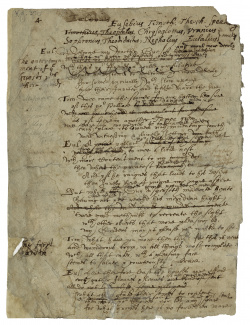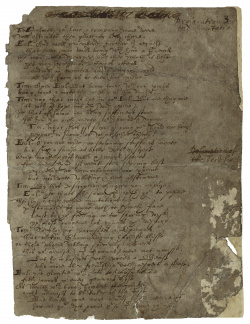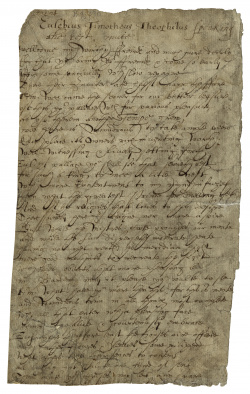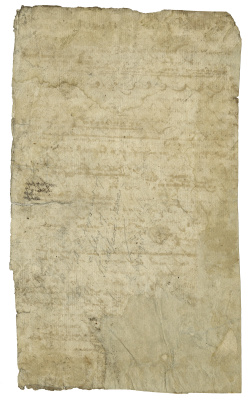Eusebius, Timotheus, Theophilus (Folger MS X.d.390)
Anon. (ca.1630?)
NB. Eusebius, Timotheus, Theophilus is a recent assignation for this untitled fragment, based on the character list. It should be viewed as a convenience for the database.
An alternative title, based on the source text (see below) might be The Godly Feast.
Historical Records
Folger Shakespeare Library MS fragment
Two small quarto leaves (three pages of writing) exist as Folger MS. X.d.390 (1-2):

|

|
| Folger X.d.390, fol.1a (CC BY-SA 4.0 licence; click image to view larger version). (Click here for transcription) (Click here for the relevant portion of Erasmus) |
Folger X.d.390, fol.1b (CC BY-SA 4.0 licence; click image to view larger version). (Click here for transcription) (Click here for the relevant portion of Erasmus) |

|

|
| Folger X.d.390, fol.2a (CC BY-SA 4.0 licence; click image to view larger version). (Click here for transcription) (Click here for the relevant portion of Erasmus) |
Folger X.d.390, fol.2b (CC BY-SA 4.0 licence; click image to view larger version). |
Fols.1a & 1b are from the play in a state of composition, with heavy deletions and irregularities. Fol.2a is a fair copy of part of the same content.
Theatrical Provenance
If this is indeed a "dramatic" fragment (see Possible Narrative and Dramatic Sources or Analogues, below), its auspices are unknown. Proudfoot suspects it might be a university play:
All three pages appear to be in the hands of a single writer using Italian forms for stage directions and speech prefixes and English with some Italian forms for the speeches. The hands resemble some found in Oxford and Cambridge manuscripts of the early seventeenth century and are undoubtedly those of an author in process of composition. The stanzaic verse of lines 43-80 suggests an occasional entertainment, either in a college or a private house, rather than a play. (59)
Probable Genre(s)
University play? (Proudfoot). Christian and/or Classical.
Possible Narrative and Dramatic Sources or Analogues
As McInnis and Steggle argue (in “Folger MS X.d.390 (1-2), and Folger MS X.d.391,” Notes & Queries 58.3 [Sept 2011]), this manuscript fragment is a verse translation of part of Erasmus's Colloquies, more specifically, the Convivium religiosum or The Godly Feast (1522). This identification has not been made previously, and is not recorded in the Folger's catalogue or Proudfoot's Malone Society edition.
Erasmus's editor, Craig Thompson, writes the following about this particular colloquy:
'The Godly Feast' opens with a deceptive informality that puts the guests (and readers) at their ease. After a cordial welcome they are taken on a tour of house and gardens, then to luncheon, where they engage in a leisurely examination of serious, and some of them profound, subjects. After that they receive gifts, are shown other parts of the estate, and then take their leave. The dialogue has a coherence and unity that strengthen verisimilitude. Its subjects preclude much of the banter, jokes, and satire so common in many other Erasmian dialogues, but in spite of that it has always been one of the most admired of the colloquies. Besides its literary excellence as dialogue not undeserving of comparison with Platonic or (more closely) Ciceronian prototypes, its blending of classical and Christian themes produces a superb illustration of the spirit of the Christian humanism we associate with the name of Erasmus. Yet this blend or harmony is not a matching of components possessing equal value. Religion is the dominant, controlling concern, Christ the invisible but principal guest. (173)
A "colloquy" being a dialogue, this identification of Erasmus's work as the subject matter raises the question of whether this MS fragment is indeed "dramatic" and a lost play, or merely a verse translation intended for reading. Hence where Proudfoot assumes the hands are "undoubtedly those of an author in process of composition" (59), it may instead be the case that the author is in the process of translation.
NB. The Folger / Proudfoot's designation of the folio leaves as 1a and 1b (with 2a being a fair copy of 1a's text) is somewhat misleading. Fol.1a bears the page number "4", whilst fol.1b bears "3", suggesting an inverted order. The Erasmian lines translated in fol.1b also occur before the corresponding lines for fol.1a.
References to the Play
(Information welcome)
Critical Commentary
The two leaves of this fragment once constituted part of a collection of miscellaneous manuscripts formed by Frederick Hendricks c.1891 (Halliwell-Phillipps and Roach Smith on Shakespeare (manuscript), 1891). Hendriks had noted of the fragment that "[t]he handwriting closely resembles that of Philipe Massinger" (Hendricks fol.126), an attribution cautiously repeated by modern pencil notes on the MS itself: "M.S. fragment of a play of Shakespeare's time. / ? Massinger" (fol.2av). There appears to be no basis for this attribution, Proudfoot noting simply "The hand bears no resemblance to that of Massinger" (59). It may be of relevance, however, that there is a lost Massinger play of 1631 entitled Feast (or taste) and Welcome.
For What It's Worth
The Erasmian colloquy partially translated here was first printed (in Latin) in 1522; the English translation used for the transcription of relevant passages in this LPD entry is from 1689. Unfortunately this proves no help in dating the play beyond the nominal assignation of the 1630s (made by the Folger and repeated by Proudfoot).
Works Cited
Site created by David McInnis, University of Melbourne; updated by David McInnis and Matthew Steggle, 21 June 2016.